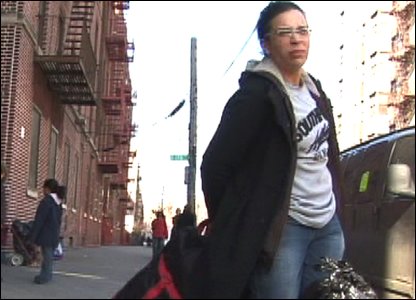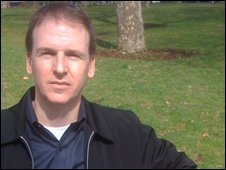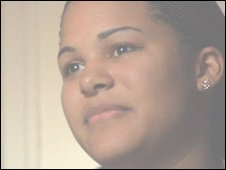Sophist
Platinum Member
- Mar 26, 2009
- 4,484
- 3,400
Maisha yapo mashakani Amerika.

Kara says her children get picked on at school because the family is homeless
As the US recession continues, the effects of rising adult unemployment are being shared by schoolchildren, as the BBC's Dumeetha Luthra in New York has been finding out.
Kara Gonzalez lost her home last year. It was after her husband lost his job, and they couldn't meet the payments for their apartment in the Bronx.
"We started getting backed up on our bills. There was a time where we went a week or so without any electric."
Then it got from bad to worse. Her husband tried to bail them out on the wrong side of the law. He was caught and jailed.
Kara could not cope.
"I couldn't do it without no help from my hub. So I lost my house and we ended up losing everything."
Suddenly the family was out on the street - five children who had nowhere to call home.

Staff at Coalition for the Homeless have noted a rise in US homelessness
Kara's experience is just one instance among the rising number of families in the United States who are now homeless. In New York, the numbers have reached near record levels.
"There's no question that we're seeing homelessness increasing throughout the country," says Patrick Marquee, from the New York-based advocacy group Coalition for the Homeless.
"States that have been hard hit by the mortgage foreclosure crisis are seeing significant increases in family homelessness," he says.
"But even in states like New York that have not been as hard hit by the foreclosure crisis we're seeing a rise in family homelessness largely because of rising unemployment."
Homeless students
In New York, two-thirds of the people in shelters are families - some 15,000 children. Across the country it is 1.5m children.
At the Morris Academy in the city's Bronx district, the teachers have noticed that there has been an increase in the number of their students becoming homeless.
The children who come forward are only the tip of the problem, according to Daniel Nartey, who teaches at Morris Academy. He says you have to read the signs, as generally the kids are reluctant to admit it.
"It shows in different ways. Sometimes it becomes noticeable by students just starting to appear late," Mr Nartey says.
"At other times some start showing up to school a whole lot earlier," he adds, "so you have to look at certain things and try to figure out what could this possibly mean, because they are not always comfortable approaching someone about that kind of a situation."
Studies have shown that homeless children do not perform as well at school as their counterparts from more stable situations. Daniel was himself homeless as a child and knows exactly what they are going through.
"It puts your mind in a totally different place. You have to ask yourself, 'Well, what's going on tonight? Am I going to have something to eat tonight? Are we sleeping somewhere tonight? And if we sleep there, am I going to feel safe there tonight?'" says the Morris Academy teacher.
"When you have those kind of security issues in your head, it's hard to just be able to sit down and say 'oh, man, let me focus real hard on this homework and let me make sure I spend a lot of time studying'. It's hard to spend a lot of time studying in that situation."
'So embarrassed'
When I first met the Gonzalez family, they were moving from one shelter to another. Kara says her children get picked on at school because of their situation.
"It's a shame for my kids because they're innocent in this. It's not their fault that we're homeless. It's not their fault that we don't have jobs, that we lost our jobs."
Her 18-year-old daughter Megan helps with the younger children. She can't bear the thought that she is homeless.
"When I hear that word, it like... I cringe inside, me like a 'homeless person'?"
She sighs and recoils at the thought and the reality.

 My siblings have changed, they're ghetto, they don't have respect anymore and that saddens me
My siblings have changed, they're ghetto, they don't have respect anymore and that saddens me

Megan
"When we get on the train, we don't have money.
"My mom will ask someone to swipe us on. I'm so embarrassed. I hate that. I just feel that this is not the life that I should be living. Like, I should have to ask someone to swipe me on to get on to the train. I should have $2," Megan says.
She wants to be an English professor and is hoping for a scholarship to study English this year, but she worries about her siblings. She says they have already changed.
"I just feel that when they grew up we lived in the suburbs and so they grew up a little better. We've been here less than a year, and they've just changed, they're ghetto, they don't have respect any more and that saddens me.
"I just hope that soon they'll be out of the situation and get back that respect and those manners they've lost, because they used to have manners, they used to be good kids," she says of her siblings.
From security to instability, from one day to the next, children have found their lives turned around.
They are struggling with the day-to-day realities of survival, and at the same time there is a danger that they are falling behind in their education.
Not only is their present affected, there is a real concern their future could also be blighted.
Source: BBC NEWS | UK | Education | US downturn hits schoolchildren

Kara says her children get picked on at school because the family is homeless
As the US recession continues, the effects of rising adult unemployment are being shared by schoolchildren, as the BBC's Dumeetha Luthra in New York has been finding out.
Kara Gonzalez lost her home last year. It was after her husband lost his job, and they couldn't meet the payments for their apartment in the Bronx.
"We started getting backed up on our bills. There was a time where we went a week or so without any electric."
Then it got from bad to worse. Her husband tried to bail them out on the wrong side of the law. He was caught and jailed.
Kara could not cope.
"I couldn't do it without no help from my hub. So I lost my house and we ended up losing everything."
Suddenly the family was out on the street - five children who had nowhere to call home.

Staff at Coalition for the Homeless have noted a rise in US homelessness
Kara's experience is just one instance among the rising number of families in the United States who are now homeless. In New York, the numbers have reached near record levels.
"There's no question that we're seeing homelessness increasing throughout the country," says Patrick Marquee, from the New York-based advocacy group Coalition for the Homeless.
"States that have been hard hit by the mortgage foreclosure crisis are seeing significant increases in family homelessness," he says.
"But even in states like New York that have not been as hard hit by the foreclosure crisis we're seeing a rise in family homelessness largely because of rising unemployment."
Homeless students
In New York, two-thirds of the people in shelters are families - some 15,000 children. Across the country it is 1.5m children.
At the Morris Academy in the city's Bronx district, the teachers have noticed that there has been an increase in the number of their students becoming homeless.
The children who come forward are only the tip of the problem, according to Daniel Nartey, who teaches at Morris Academy. He says you have to read the signs, as generally the kids are reluctant to admit it.
"It shows in different ways. Sometimes it becomes noticeable by students just starting to appear late," Mr Nartey says.
"At other times some start showing up to school a whole lot earlier," he adds, "so you have to look at certain things and try to figure out what could this possibly mean, because they are not always comfortable approaching someone about that kind of a situation."
Studies have shown that homeless children do not perform as well at school as their counterparts from more stable situations. Daniel was himself homeless as a child and knows exactly what they are going through.
"It puts your mind in a totally different place. You have to ask yourself, 'Well, what's going on tonight? Am I going to have something to eat tonight? Are we sleeping somewhere tonight? And if we sleep there, am I going to feel safe there tonight?'" says the Morris Academy teacher.
"When you have those kind of security issues in your head, it's hard to just be able to sit down and say 'oh, man, let me focus real hard on this homework and let me make sure I spend a lot of time studying'. It's hard to spend a lot of time studying in that situation."
'So embarrassed'
When I first met the Gonzalez family, they were moving from one shelter to another. Kara says her children get picked on at school because of their situation.
"It's a shame for my kids because they're innocent in this. It's not their fault that we're homeless. It's not their fault that we don't have jobs, that we lost our jobs."
Her 18-year-old daughter Megan helps with the younger children. She can't bear the thought that she is homeless.
"When I hear that word, it like... I cringe inside, me like a 'homeless person'?"
She sighs and recoils at the thought and the reality.



Megan
"When we get on the train, we don't have money.
"My mom will ask someone to swipe us on. I'm so embarrassed. I hate that. I just feel that this is not the life that I should be living. Like, I should have to ask someone to swipe me on to get on to the train. I should have $2," Megan says.
She wants to be an English professor and is hoping for a scholarship to study English this year, but she worries about her siblings. She says they have already changed.
"I just feel that when they grew up we lived in the suburbs and so they grew up a little better. We've been here less than a year, and they've just changed, they're ghetto, they don't have respect any more and that saddens me.
"I just hope that soon they'll be out of the situation and get back that respect and those manners they've lost, because they used to have manners, they used to be good kids," she says of her siblings.
From security to instability, from one day to the next, children have found their lives turned around.
They are struggling with the day-to-day realities of survival, and at the same time there is a danger that they are falling behind in their education.
Not only is their present affected, there is a real concern their future could also be blighted.
Source: BBC NEWS | UK | Education | US downturn hits schoolchildren